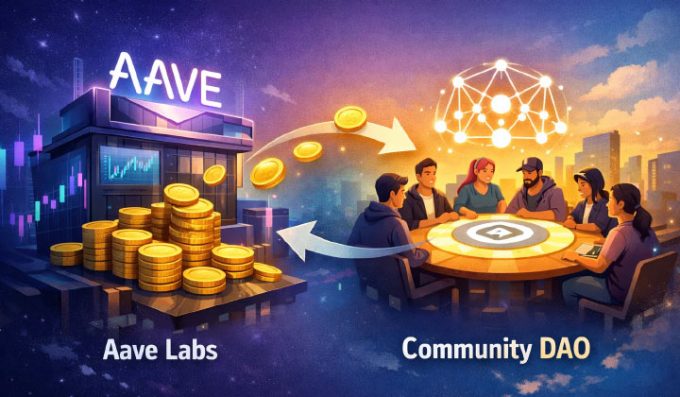Uncover the transformative potential, advantages, and challenges as DeFi reshapes how we engage with money. Discover the revolutionary shift towards a decentralized financial ecosystem, empowering individuals and challenging traditional banking norms. Join us in understanding the evolution, risks, and opportunities presented by this groundbreaking paradigm shift.
The rise of Decentralized Finance (DeFi) has ushered in a transformative era in the financial landscape. This revolutionary concept is reshaping conventional financial systems by empowering individuals with greater control over their assets, challenging traditional banking norms. In this article, we’ll delve into the swift emergence of DeFi and its profound impact on conventional financial institutions.
 Decentralized Finance: A Revolutionary Shift
Decentralized Finance: A Revolutionary Shift
DeFi operates as a decentralized financial ecosystem built on blockchain technology, eliminating the need for intermediaries like banks and insurance companies. Smart contracts, programmable agreements executing under specified conditions, ensure transparency, security, and operational efficiency.
Unprecedented Growth and Adoption
DeFi has witnessed an exponential surge, attracting both retail and institutional investors. The Total Value Locked (TVL) in DeFi protocols has soared to unprecedented levels, driven by increased cryptocurrency accessibility, alluring rewards, and the soaring popularity of decentralized apps (dApps).
Advantages of DeFi
DeFi presents numerous advantages compared to traditional financial systems. It fosters financial inclusion by offering services to the unbanked, enabling anyone with internet access to engage in financial activities without needing a bank account. Moreover, by eliminating intermediaries, DeFi reduces transaction costs and speeds up transactions, ensuring direct, efficient, and cost-effective dealings between parties.
DeFi’s advantages over traditional finance are multifaceted:
- Enhanced Accessibility: DeFi offers broader access to financial services, particularly for the unbanked or underbanked segments.
- Transparency and Security: Leveraging blockchain, DeFi provides a tamper-proof and decentralized transaction ledger, ensuring transparency and security.
- Reduced Transaction Costs: DeFi streamlines transactions, reducing costs and enhancing transaction speeds.
- Smart Contract Efficiency: The incorporation of smart contracts within DeFi streamlines processes, automating and enhancing the efficiency of financial transactions.
Additionally, DeFi ensures enhanced transparency and security through immutable blockchain transactions and smart contracts, mitigating the risk of human error or manipulation.
Decentralized Finance (DeFi) thrives through two pivotal technologies: blockchain and smart contracts.
Blockchain, the backbone of DeFi, ensures secure and transparent transactions sans intermediaries. These decentralized ledgers create tamper-proof transaction records, minimizing fraud and amplifying transparency.
Smart contracts, based on blockchain, facilitate the automation necessary for DeFi services. Operating as self-executing contracts, they embody agreements within lines of code. These contracts power decentralized applications (dApps), enabling various financial functions like lending, borrowing, and trading. Check out our latest article on smart contracts.
dApps, the software apps running on blockchain networks, serve as the gateway for users to access decentralized finance. Open, transparent, and resistant to censorship, dApps facilitate peer-to-peer interactions in DeFi.
Key DeFi platforms and protocols, such as Ethereum and Polkadot, drive the decentralized finance landscape. Ethereum stands as the most utilized blockchain, while Polkadot offers interoperability among diverse blockchains. Platforms like Chainlink ensure secure oracle services, and Uniswap operates a decentralized exchange for token trading.
Real-world DeFi projects, like MakerDAO, showcase DeFi’s potential for innovation. It features DAI, a stablecoin pegged to the US dollar, generated through collateralized debt positions (CDPs). Uniswap, a decentralized exchange, allows token trading without intermediaries using an automated market-making (AMM) system. Others like Aave facilitate decentralized lending, and Compound enables users to earn interest on crypto holdings.
However, challenges exist in the DeFi realm:
- Security concerns loom over smart contracts, susceptible to cyber-attacks despite blockchain’s inherent security.
- Scalability issues hinder transaction speed and efficiency within DeFi protocols, intensifying as user numbers surge.
- Rising regulatory scrutiny poses challenges as DeFi, designed to be decentralized and permissionless, attracts more attention from regulators.
- DeFi’s promises are met with challenges, making it essential to navigate these complexities for its sustained growth and evolution.
Challenges and Potential Risks
However promising, DeFi faces regulatory uncertainties due to its unregulated environment, posing challenges concerning investor protection, anti-money laundering procedures, and market stability. The rapid innovation in DeFi has led to the introduction of intricate financial products, which, while offering potential, also bring risks such as smart contract vulnerabilities and market manipulation.
Navigating the dynamic realm of DeFi demands strategic planning and astute maneuvering. It begins with a comprehensive risk assessment, uncovering potential vulnerabilities, and devising robust mitigation strategies. Staying abreast of evolving regulations is equally crucial, ensuring adaptability in an ever-shifting regulatory landscape.
Educating users about the nuances of DeFi stands pivotal in addressing its opportunities and challenges. By illuminating the risks and rewards, businesses empower users to navigate this innovative landscape effectively, fostering adoption while mitigating potential risks.
Furthermore, seizing the potential of DeFi involves exploring uncharted territories. Uncover fresh applications and utilities for DeFi platforms, igniting innovation to unlock new revenue streams and secure a competitive edge in today’s evolving marketplace. Embracing these strategies propels businesses towards harnessing the full potential of DeFi, navigating challenges, and seizing emerging opportunities.
Impact on Traditional Financial Systems
The ascent of DeFi poses significant challenges to conventional banking institutions. It challenges their dominance by providing alternative, accessible, efficient, and transparent financial services. As DeFi gains momentum, incumbent banks and intermediaries might experience reduced demand for their services.
Furthermore, by democratizing finance, DeFi ensures equitable access to financial services, breaking the centralized grip that often benefits established and affluent organizations.
Empowering Individuals
DeFi and Web3 technologies empower individuals by granting access to financial services without relying on intermediaries. Users can engage in various financial activities directly from their digital wallets, ensuring inclusivity and ownership of assets without third-party involvement.
Disrupting Financial Dynamics
DeFi and Web3 challenge entrenched financial power structures by shifting control to individuals. Utilizing decentralized networks and smart contracts, these technologies enable direct peer-to-peer transactions, reducing dependence on intermediaries. This transformation is unsettling traditional business models and threatens established institutions.
Adapting to Change
Institutions that fail to acknowledge DeFi’s potential risk of falling behind in this evolving landscape. Collaboration between traditional institutions and DeFi projects can pave the way for innovative hybrid models, benefiting from the strengths of both centralized and decentralized systems.
Moving Forward
Regulators, policymakers, and industry players must collaborate to establish a regulatory framework that fosters innovation while ensuring investor protection and market stability. Encouraging responsible growth and embracing innovation will be pivotal in realizing the immense potential of decentralized finance.
In conclusion, DeFi stands as a game-changer, redefining how we interact and access financial services. While challenges persist, fostering responsible growth and regulatory clarity will be essential to harnessing the full potential of DeFi’s transformative power.
You need to login in order to Like













